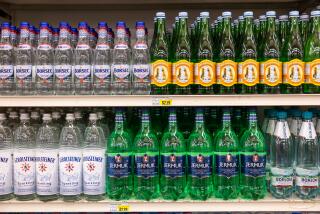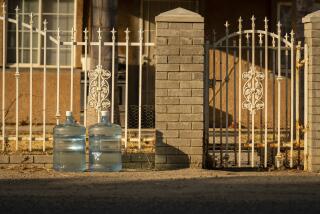Water: Good for the Body, but It Could Get Costly
Most Americans still don’t drink enough water every day and often suffer from fatigue, headaches and other symptoms of chronic dehydration, according to a new national survey sponsored by Rockefeller University in New York City and the International Bottled Water Assn.
But if consumers plan to drink bottled water to meet the eight glasses recommended daily, they better be prepared to drain their wallets: Bottled water can run up to 30 cents per glass--or $72 a month--according to a new review by Consumer Reports.
And cost doesn’t guarantee taste or safety, Consumer Reports found. All 39 brands of bottled water tested met current standards for chlorine byproducts. But several brands unnamed by Consumer Reports contained more arsenic than would be allowed by the Environmental Protection Agency’s proposed standard. A couple of samples had a fairly high level of bacteria “that can indicate spotty sanitation,” and the testing found that eight of 10 large water jugs tested “leached a potentially problematic plastic component into the water.”
The only bottled water to earn an excellent taste rating was also the most expensive. Volvic Natural Spring Water was described as “very clean, no off flavors.” But it also cost 29 cents a glass.
Better buys with little taste difference were Dannon Natural Spring Water (14 cents a glass), Arrowhead Mountain Spring Water, Kmart’s American Fare Natural Spring Water and Albertson’s A+ Natural Spring Water (all 12 cents a glass). Each earned a “very good” taste rating, while the better-known Evian cost at least twice as much (28 cents a glass) and only earned a “good” taste rating.
Bottles made of polyethylene terephthalate, or PET, are clear, strong and leave “nothing more than a faint sweet or fruity plastic flavor, if that.” Bottles made from high-density polyethylene (the opaque plastic often used for milk and juice) cost less but impart “a slight melted-plastic taste to water,” Consumer Reports found, and are more likely to absorb flavors from foods stored nearby.
Polycarbonate--the bluish plastic found in tough five-gallon jugs of water--scored well on flavor. But Consumer Reports found that these bottles “sometimes left residues of a worrisome chemical called bisphenol-A,” which mimics the action of the hormone estrogen in animal studies.
The Rockefeller University survey, which included 2,814 American adults and was conducted by Yankelovich Partners, found that Americans average six glasses of water daily, instead of the recommended eight. But they also report drinking nearly six glasses a day of coffee, tea, carbonated soda with caffeine and alcohol--all of which dehydrate the body. Not drinking adequate water took a toll on participants. Twenty percent said they felt tired or groggy--a classic sign of dehydration. Others complained of itchy skin, headaches, indigestion, lapses in mental concentration and constipation, all common signs of dehydration.
More to Read
Sign up for Essential California
The most important California stories and recommendations in your inbox every morning.
You may occasionally receive promotional content from the Los Angeles Times.










